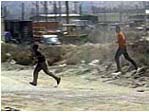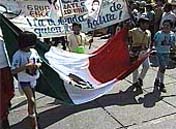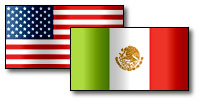Dear Araceli,
It was extremely frustrating. The situation at that time was very polarized and as a teacher near downtown Los Angeles working in a school with a large number (majority?) of immigrant students, I felt like I was right in the middle of it. I did not see too much activity concerning Proposition 209 or other legislation, but Proposition 187 was a huge deal. I can only speak for myself, however, but politics contributed to an environment which was unpleasant for me both at school and in the general community.
In my experience, the problem with being in a situation that gets so polarized is that the center (reason!) disappears and one is forced to choose one side or the other; remaining ambivalent or divided becomes less and less an option. In the vote on Proposition 187 in 1994 and 209 and other anti-immigrant legislation of 1996, I never could get myself to agree with either the pro-Latino or anti-immigrant forces which both were so strident and vociferous. In fact, I considered them as nothing less than the Scylla and Charybdis of California politics!
There were the pro-Latino organizations which glossed over the problems of immigration in the attempt to help a community for which they cared very deeply. It was advocacy politics where the activists of the raza had an emotional stake in the argument and so would perform any intellectual contortion to rationalize and or apologize for the many problems in the immigrant Latino communities. I had serious doubts about the massive immigration of millions of so many poor and uneducated Mexicans and Central Americans to an Information Age United States which no longer had massive needs for unskilled labor as in the past. I never did visit a neighborhood in Southern California which had large numbers of immigrants that did not have serious quality of life issues such as gangs, serious poverty, low levels of education, teenage pregnancy, etc. ad nauseam.
It was more of a social than racial concern for me, as I had been to many areas populated by native-born Americans suffering the same problems as immigrant neighborhoods and knew many highly educated Mexicans and South Americans who could have stepped into American culture with hardly any problems (they stayed in their own countries). As the United States was no longer a young and dynamically growing country, I wondered about the ability of the country to adopt millions and millions of poor people successfully as had more or less occurred in the past. I wondered if the neighborhoods which had become immigrant havens would be violent and poverty stricken forever. I could see the good the immigrants brought to America, but I could also see the bad.
On the other hand, I got along no better with the anti-immigrant forces which looked at Mexicans and immigrants a priori as a negative influence on the United States. In my experience, immigrants mostly did not come to the United States to go on welfare or take advantage of "freebies" from the government. That might happen later, as immigrants become "Americanized" and learn how to use/abuse the system. However, most immigrants I met came to the United States because they were poor, desperate, and wanted a better life for themselves and their children than what their own countries offered them. And who can blame them?
I often had people frame the Proposition 187 question in racist tones which were ugly and offensive. Many people considered Mexico to be synonymous with poverty and ignorance and this was just not true. Over the years I had
learned great respect for the dignity of traditional Mexican culture. They may have a bad government, but they are basically a good people. And I never forgot what Franklin D. Roosevelt said about America and immigrants: "Remember, remember always that all of us, and you and I especially, are descended from immigrants and revolutionaries." Now that it is clearly in my past, I do not at all regret teaching immigrant children many of whom will be grow up to be productive members of American society. I can take some pride in being a small part of that process.
And they wanted me as a school teacher to help deport my students out of the country? There was a reason why I became a teacher and not a border patrolman. It was going to be a cold day in hell before I turned one of my students over to immigration authorities. I had no problem with the Immigration and Naturalization Service doing their job and expelling people from the country who were here illegally, but the schools are not the place to do that. And then you had the unhappy Latino activists yelling angrily about the "racist" country they lived in and who carried Mexican flags during public protest marches. They seemed to say that anybody from any other country should be able to come to the United States if they wanted and that foreign citizen immigrants should be able to vote in American elections, which seemed to me clearly ridiculous. As if a person could simply sneak across the border and rightfully claim to be a part of the family of the United States!
The situation was polarized and emotions ran high on all sides. In my school, the principal Mrs. Rivera would go over the loudspeaker before every lunch and warn in the most dire the students not to walk out of school in protest like was happening in other places. The administration convened a teacher meeting after school the day of the Proposition 187 election where we discussed plans for rioting and violence. It was, in short, a mess. In answer to your question, I felt like I was in the middle and that is not a pleasant place to be in such a situation.
They say that in a democracy political opponents should take the adversarial approach to problems. Supposedly in this way each side will be forced to compromise and while nobody gets everything they want, everybody gets something. This might be so, and I can think of no better way of conducting politics in the real world of diverse interests and philosophies. But, damn!, it can be loud and messy. When I finally got out of Los Angeles, I had been cured forever of wanting to have anything to do with California politics.
I hope that answers your question, Araceli. Good luck with your research paper.
Very Truly Yours,
Richard Geib







 Back to Inner-City Blues Page
Back to Inner-City Blues Page